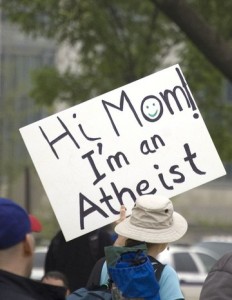by Michela Corcorran, PRRI intern
Atheists, agnostics, and secular humanists alike gathered on the National Mall last weekend to celebrate secular values, and protest the influence of religion in politics. The “Reason Rally,” sponsored by many of the country’s foremost secular organizations, welcomed an estimated 20,000 people to its cause on Saturday. The rally hosted a number of prominent speakers, including prominent atheist scholar Dr. Richard Dawkins. It also included video speeches from two congressmen, Representative Pete Stark (D-CA), the first openly atheist member of congress, and Senator Tom Harkin (D-IA), a Catholic.
The “Reason Rally” sought to encourage Americans who embrace a secular worldview to “come out of the closet” to support “secular equality,” according to the Reason Rally website. The timing of the event coincides with heightened awareness and concern over the issue of religious liberty, and the reemergence of “culture war” issues in the public consciousness.
American attitudes toward atheists have historically been fairly negative and they continue to be one of the least-liked “religious” communities in the U.S. In 2011, less than half (45%) of Americans had a favorable view of atheists; no other major religious group in the U.S. is viewed more negatively. According to PRRI’s 2011 American Values Survey, less than one-third (31%) of Americans would be at least somewhat comfortable with an atheist serving as President.
However, American attitudes towards atheists are shifting, particularly among Millennials (age 18-29). According to the 2011 American Values Survey, 29% of young adults under the age of 30 describe themselves as unaffiliated, describing their religion as “atheist,” “agnostic,” or “nothing in particular.” They also view atheists much more favorably than Americans in general.
If the rally’s organizers were seeking to provide a counterweight to “God-talk” in the political sphere, they may win some sympathy from the general public. A recent Pew Research Center survey found that 38% of Americans believe there is too much expression of religious faith and prayer from political leaders today, a marked increase of 26 percentage points since Pew first asked the question in 2001. The survey also found that a majority of Americans (54%) say that churches should keep out of politics, compared to 40% who say they should express their views on day-to-day social and political questions.
But in a country where atheists and agnostics make up less than 5% of the adult population, the “Reason Rally” organizers may still have a long way to go before they can expect to exert the type of political influence characteristic of other religious groups. Moreover, the degree to which the general public views atheists as anti-religious could stymie public acceptance of any type of secular movement. In this light, Richard Dawkins’ exhortation to the assembled “Reason Rally” crowd to “‘ridicule and show contempt’” for religious doctrines and sacraments may have done more harm than good.
